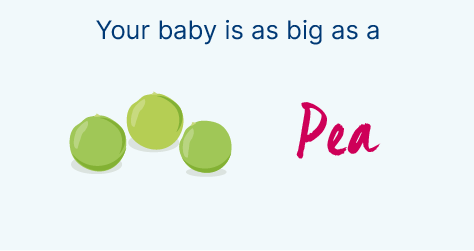What's happening in week 6 of your pregnancy
6 weeks pregnant and the changes in your growing baby (and your body) continue big time
At a glance
- Your baby's heart is the size of a tiny pea
- All your baby's other vital organs are now in place too
- Now is the time to really watch your diet

How big is my baby at 6 weeks pregnant?
If you can imagine a tiny poppy seed, that’s the size of your growing baby's heart now. Their heart is also changing from being a simple, single tube to a complex four chamber organ which will pump blood around their body. How amazing! All your baby's other vital organs – the kidneys, lungs and liver – are now in place too, but they still have a lot of developing left to do. The little buds which will eventually become their arms and legs are also starting to develop. At this stage your baby has a curved back and a tail making them resemble a tadpole.
Did you know?
- Your baby is the size of a pea
- From conception to birth, a baby's weight increases 3,000 million times
- Your baby is now about 1 cm in size
- Your baby has tiny 'arm buds' which look like paddles
- Your baby's brain waves are strong enough to be recorded
You at 6 weeks pregnant
You might be feeling a touch 'hormonal' by week six, and your morning sickness, tiredness and general feelings of exhaustion might have really kicked in.
Now is the time to really watch your diet – not only to give you nutritious, energy giving foods, but also to make sure you are avoiding anything that could be harmful to your baby.
Start taking a Vitamin D Supplement
As well as folic acid, vitamin D is also an important vitamin in pregnancy. It’s essential for the normal development of bones. In fact, Vitamin D supplementation is recommended for the whole of the UK population, especially during the autumn and winter. The main source of Vitamin D comes from having sunlight directly on the skin.
In the UK, we live much of our life indoors with limited sunlight which is why you need 10 micrograms (10mcg) of vitamin D a day.
Pregnant women, women with a child under 12 months and children aged from birth to four years who are receiving Healthy Start vouchers, are entitled to free Healthy Start vitamins so ask your midwife or GP. If you don’t qualify for the scheme you can buy Vitamin D supplements at a pharmacy or supermarket.
You are more likely to have low levels of vitamin D if you:
- Always cover your skin
- Have dark skin
- Use high-factor sun block
- Have BMI of 30 of above
Foods containing Vitamin D include:
- Eggs
- Oily fish (e.g. salmon and sardines)
- It’s sometimes in margarines and added to breakfast cereals too
In sunny weather, just 15 minutes a day in the sun, two or three times a week, should help - and you only need to expose your arms and face.
Did you know?
- During pregnancy, your sense of smell increases drastically, as does your sense of taste
- Pica is a recognised condition where pregnant women crave non-foods like chalk and charcoal
What to think about at 6 weeks pregnant?
You might be giving off a few signs of pregnancy to other people now, particularly if you are steering clear of the office coffee machine and its overwhelming aromas, or making lots of visits to the bathroom if you are feeling sick or needing to wee a lot (or just for some breathing space if you are feeling mega tired!).
Most women wait for their dating scan to share their good news with their friends and colleagues, so you might have to keep up an 'upset tummy' or 'ate something dodgy' line for a while!
Could be time to think about how you'll make your exciting announcement though – sharing your scan pic on social media, or just spreading the word via good old fashioned face to face communication?
Signs and symptoms at 6 weeks pregnant
Morning sickness
It may be called ‘morning’ sickness but if you’ve got it bad you’ll already know it can affect you throughout the day. Morning sickness usually starts around week 6 of pregnancy and will last until around week 14. Caused by hormonal changes, morning sickness is no fun, but it shouldn't affect your general health or your baby in any way. Luckily, your body has good stores of essential nutrients to draw on. However, if you’re being sick a lot, you may have severe morning sickness (hyperemis gravidarum) which, in severe cases, can be eased with anti-sickness medication. It’s important to get help, because it can make you very ill and severely dehydrated.
Peeing more often
Another symptom that you may not be expecting so early in your pregnancy is needing to pee more often, but actually it’s a common early sign.
Shortly after you become pregnant, hormonal changes cause blood to flow more quickly through your kidneys, filling your bladder more often. Even in the first trimester, your uterus puts pressure on your bladder, giving it less room to store urine. Luckily this pressure eases as your pregnancy progresses.
Watch our video on: Dealing with morning sickness
Video: Should I give up smoking?
